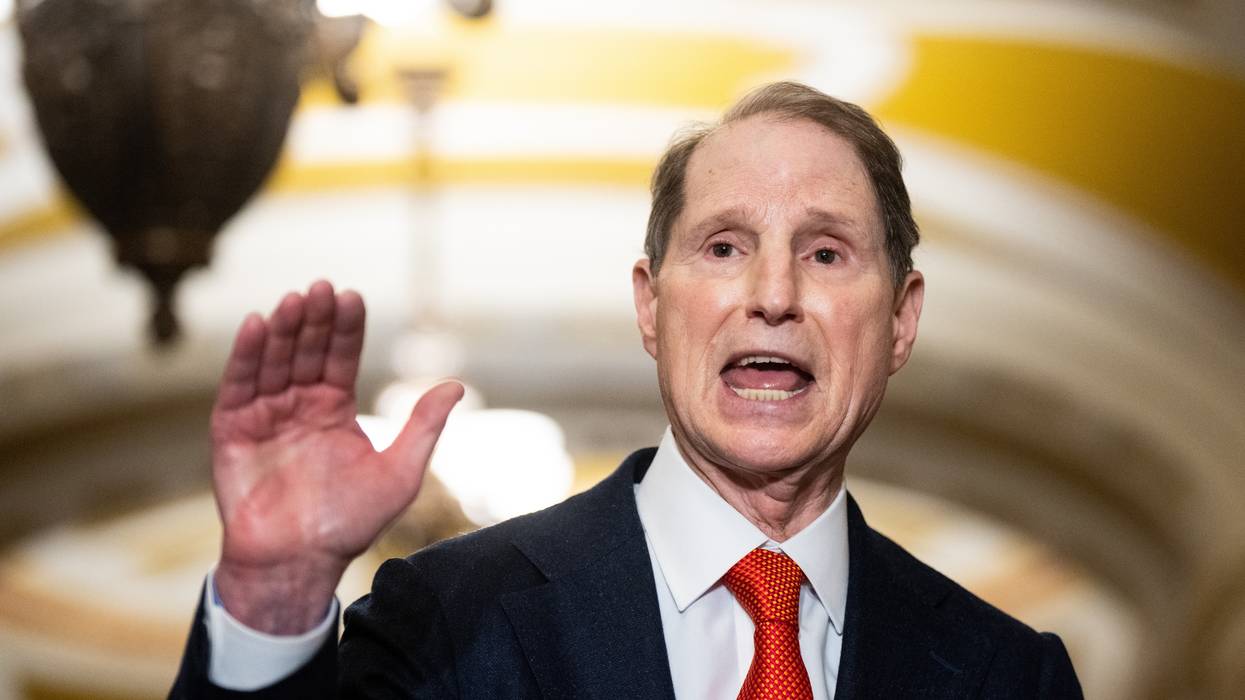Sen. Mark Kelly (Ariz.), a former Navy captain, notes in the video that "like us, you all swore an oath" to the US Constitution
Reps. Jason Crow (Colo.), Chris Deluzio (Pa.), Maggie Goodlander (NH), and Chrissy Houlahan (Pa.)—all veterans of the US military and intelligence community—join the senators in calling on service members to stand up to any illegal orders from the Trump administration and "don't give up the ship."
Miles Taylor, a former chief of staff for the Department of Homeland Security who anonymously spoke out against Trump in a high-profile op-ed and book during his first term, said that it is "pretty insane that we are living in a moment where a video message like this [is] necessary."
Also responding to the video on the platform X, Stephen Miller, White House deputy chief of staff for policy and homeland security adviser, claimed that "Democrat lawmakers are now openly calling for insurrection."
Kelly hit back, citing the January 6, 2021 attack: "I got shot at serving our country in combat, and I was there when your boss sent a violent mob to attack the Capitol. I know the difference between defending our Constitution and an insurrection, even if you don't."
Slotkin also responded, saying: "This is the law. Passed down from our Founding Fathers, to ensure our military upholds its oath to the Constitution—not a king. Given you're directing much of a military policy, you should buff up on the Uniformed Code of Military Justice."
Trump weighed in on his Truth Social platform just after 9:00 am on Thursday morning, writing: "It's called SEDITIOUS BEHAVIOR AT THE HIGHEST LEVEL. Each one of these traitors to our Country should be ARRESTED AND PUT ON TRIAL. Their words cannot be allowed to stand—We won’t have a Country anymore!!! An example MUST BE SET."
"This is really bad, and Dangerous to our Country. Their words cannot be allowed to stand. SEDITIOUS BEHAVIOR FROM TRAITORS!!! LOCK THEM UP???," Trump continued, linking to the right-wing Washington Examiner's coverage and signing both posts "President DJT."
Just over an hour later, the president added, "SEDITIOUS BEHAVIOR, punishable by DEATH!"
Responding with a lengthy joint statement, the lawmakers behind the video reiterated their commitment to the oaths they took, and said that "what's most telling is that the president considers it punishable by death for us to restate the law."
"Our servicemembers should know that we have their backs as they fulfill their oath to the Constitution and obligation to follow only lawful orders," they added. "Every American must unite and condemn the president's calls for our murder and political violence. This is a time for moral clarity."
Congresswoman Pramila Jayapal (D-Wash.)—who has for years faced threats from Trump supporters, including Arizona state Rep. John Gillette (R-30) in September—stressed that the president's "calls for political violence are completely unacceptable."
Rep. Ilhan Omar (D-Minn.), another frequent target of right-wing threats, similarly took aim at Trump's sedition remarks, saying, "None of this is normal."
Senate Minority Leader Chuck Schumer (D-NY) said on the chamber's floor Thursday: "Let's be crystal clear: The president of the United States is calling for the execution of elected officials. This is an outright threat, and it's deadly serious. We have already seen what happens when Donald Trump tells his followers that his political opponents are enemies of the state."
"We all remember what January 6th was like. We lived through January 6th. We have lived through the assassinations and attempted assassinations this year. We have members whose families have had to flee their homes," he continued. "When Donald Trump uses the language of execution and treason, some of his supporters may very well listen. He is lighting a match in a country soaked with political gasoline. Every senator, every representative, every American—regardless of party—should condemn this immediately and without qualification."
Melanie D'Arrigo, executive director of the Campaign for New York Health, said Thursday: "Trump tried to overthrow our government almost five years ago, and is calling for Dems to be put to death for sedition. If you're threatening Dems for reminding the military that they are obligated to not follow illegal orders, you're admitting your orders are illegal."
The Democrats' video and Trump's outburst come as members of Congress and legal experts lambast the Trump administration's deadly bombings of boats allegedly running drugs in the Caribbean and Pacific Ocean. Critics have emphasized that even if the targeted vessels are transporting illicit substances, the strikes are illegal.
Trump is also under fire for his attacks on immigrants in Democrat-led communities. Kelly and Slotkin, along with Democratic Sens. Tammy Duckworth (Ill.), Richard Blumenthal (Conn.), and Ron Wyden (Ore.), recently introduced the No Troops in Our Streets Act, which would limit the administration's ability to deploy the National Guard and inject $1 billion in new resources to fight crime across the country.
"Our brave military men and women signed up to defend the Constitution and our rights, not to be used as political props or silence dissent," said Duckworth, a retired Army lieutenant colonel who has been especially critical of the administration's operation in the Chicagoland area, including efforts to deploy the National Guard there.
"These un-American, unjustified deployments of troops into our cities do nothing to fight crime—they only serve to intimidate Americans in their own neighborhoods," she added. "I'm introducing this legislation with my colleagues to stop Trump's gross misuse of our military and devote more resources toward efforts that would actually help our local law enforcement—which Trump has actually defunded to the tune of $800 million."




